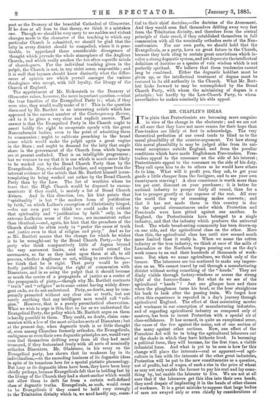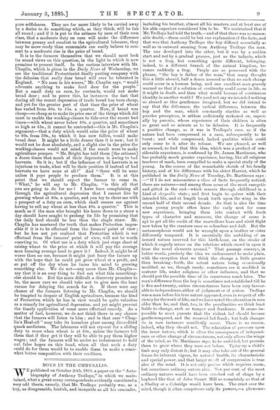MR. CHAPLIN'S IDEAS.
IT is plain that Protectionists are becoming more sanguine in view of the change in the electorate ; and we are not at all sure that they have not more reason for their hope than Free-traders are likely at first to acknowledge. The very theoretical perfection of our creed tends to blind us to the moral plausibility of the counter-argument. Yet how strong this moral plausibility is may be judged alike from its universal acceptance outside England, and from the peculiar conditions which have made Englishmen Free-traders. Freetraders appeal to the consumer on the side of his interest ; Protectionists appeal to the consumer on the side of his duty. They call upon him to do to others as he would have others do to him. What will it profit you, they ask, to get your goods a little cheaper from the foreigner, and to see your own countrymen starving ? A clear conscience is worth more than ten per cent. discount on your purchases ; it is better for national industry to prosper fairly all round, than for a few to prosper greatly at the expense of the rest. All over the world this way of reasoning makes converts ; and that it has not made them in this country is due to the special circumstances under which Protection and Free-trade were here pitted against one another. In England, the Protectionists have belonged to a single industry, and that the industry which produces the universal food. The whole bread-eating community has been drawn-up on one side, and the agricultural class on the other. More than this, the agricultural class has until nbw seemed much more limited than it really is. When we name the cotton industry or the iron industry, we think at once of the mills of Lancashire or the Northern forges pouring out as the day's work comes to an end their hundreds of .thousands of workmen. But when we name agriculture, we think only of the farmer. The labourers are too scattered to make any impression on us. We cannot travel by rail through a manufacturing district without seeing something of the " hands." They are dimly visible through factory-windows or across the strong light of the furnace-flame. But what do we see of the agricultural " hands " ? Just one glimpse here and there when the ploughman turns his head, or the hoer straightens his back to look after the passing train. We forget how often this experience is repeated in a day's journey through agricultural England. The effect of thus associating master and workman in our conception of manufacturing industries,
and of regarding agricultural industry as composed only of masters, has been to invest Protection with a special air of class-selfishness. It has seemed, in quite an exceptional sense, the cause of the few against the many, not of one section of the many against other sections. Now, one effect of the Franchise Act will be to bring the agricultural labourers out of the shade in which they have hitherto lived. In becoming a political force, they will become, for the first time, a visible industrial force. And what is yet to be seen is how far this change will place the interests—real or apparent—of agriculture in line with the interests of the other great industrim Protection will be put to the new constituencies as a question, not of profits, but of wages, of such a rise in the price of wheat as may not only enable the farmer to pay his rent and lay something by, but enable the labourer to live. We are not at all sure that if the labourers get this idea into their own heads, they need despair of implanting it in the heads of other classes of workmen. It is a great mistake to suppose that large bodies of men are swayed only or even chiefly by considerations of pure selfishness. They are far more likely to be carried away by a desire to do something which, as they think, will be fair all round ; and if it is put to the artisans by men of their own class, that a moderate duty on corn will make the difference between penury and comfort to the agricultural labourer, they may be more ready than economists can easily believe to consent to a moderate rise in the price of bread.
It is to the farmers themselves that we should most look for sound views on this question, in the light iu which it now promises to present itself. In the curious interview with Mr. Chaplin, which is given in the Daily Xews of Wednesday, we see the traditional Protectionist finally parting company with the delusion that really dear bread will ever be tolerated in England. " No man in his senses," Mr. Chaplin says, " would advocate anything to make food dear for the people." But a small duty on corn, he contends, would not make bread dear ; and to prove this, he instances the fact that during all the recent depression of trade bread has been cheap, and yet for the greater part of that time the price of wheat has varied from 40s. to 45s. a quarter. Now, if bread was cheap—so cheap as to make its price one of the things which did most to enable the working-classes to tide-over the recent bad times—with wheat never below 40s. a quarter, and sometimes as high as 45s., it cannot be contended—this is Mr. Chaplin's argument—that a duty which would raise the price of wheat to 40s. from 30s., to which it has now fallen, would make bread dear. It might be a little dearer than it is now; but it would not be dear absolutely, and a slight rise in the price the working-classes would not mind, if the result were to make agriculture prosper. " Mr. Bright has told them [the artisans] a dozen times that much of their depression is owing to bad harvests. So it is ; but if the influence of bad harvests is so injurious to trade, what will be their position if instead of bad harvests we have none at all?" And "there will be none unless it pays people to produce them." It is at this point that we should expect the farmer to come in. " What," he will say to Mr. Chaplin, " is this all that you are going to do for me ? I have been complaining all through the agricultural depression that I cannot live by growing wheat at 40s. a quarter, and you try to cheer me with a prospect. of a duty on corn, which shall ensure me against having to sell my wheat at less than 40s. a quarter." This is much as if the man who brought his horse down to a straw a day should have sought to prolong its life by promising that the daily feed should be less than the single straw. Mr. Chaplin has mastered the truth that makes Protection impossible if it is to be effectual from the farmers' point of view ; but he has not yet realised that Protection which is not effectual from the farmers' point of view, will not be worth resorting to. Of what use is a duty which just stops short of raising wheat to the price at which it will pay.the average man farming average land to grow it ? Indeed, it might be of worse than no use, because it might just buoy the farmer up with the hope that he could yet grow wheat at a profit, and so put off the day when he turns his mind to growing something else. We do not—any more than Mr. Chaplin— say that it is an easy thing to find out what this somethingelse should be. But the more difficult a discovery promises to be, the more care we should take not to give men the least
excuse for delaying the search for it. If there were any chance of the farmers listening to Mr. Chaplin, we should be tempted to despair of English agriculture, because the kind of Protection which he has in view would be quite valueless as a remedy for agricultural depression, and yet might prevent the timely application of some more effectual remedy. As a matter of fact, however, we do not think there is any chance that the farmers will listen to him ; and in that case " Chaplin's Heal-all " may take its harmless place among discredited quack medicines. The labourers will not cry-out for a sliding duty to cease when wheat is at 40s., unless the farmers tell them that if they get it they will be able to pay them higher wages ; and the farmers will be under no inducement to hold out false hopes on this head, when all that such a duty could do for them would be to enable them to make a somewhat better composition with their creditors.











































 Previous page
Previous page